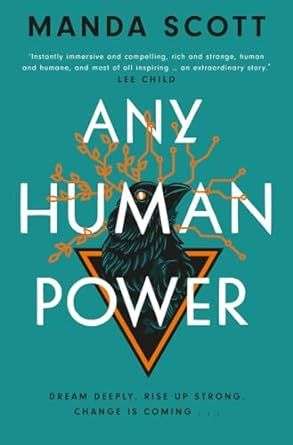
For all things fantasy, horror, and speculative fiction

Review Details
Review type: Book
Title: Any Human Power
Author: Manda Scott
Publisher: September Publishing
Release date: 6th June 2024

Reviewed by: Catherine Berridge
Any Human Power by Manda Scott
Book Review
Catherine Berridge
Alanna Penhaligon lies dying in a hospital bed. She has spent her life preparing for this moment. In her youth, a sudden loss sent her on a quest to answer the question, “What happens after death?†She swapped a medical degree for anthropology and sought out teachers and healers from a multitude of different cultural and spiritual traditions. Now, facing her own end, everything is prepared until she makes an unexpected promise to her grandson Finn that she will be there for him if he calls. And such a promise, made at death’s door, is not easily put aside.
This is the introduction to a taut political eco-thriller in which the Penhaligon family, drawn in by the activism of Lan’s granddaughter Kaitlyn Penhaligon, find themselves the centre of a struggle between youth and the powerful old guard fought through social media and the internet. Set against the backdrop of the climate crisis, the stakes are higher than anyone could imagine.
Manda Scott is the author of many previous novels, including the well-received Boudica series, but “Any Human Power†is a new departure for her. She has described this novel as a “thrutopiaâ€. This is a term now used by writers confronting the climate crisis to describe a work that has the potential to show us a way through the difficult years that lie ahead of us and possibly the greatest challenge humanity has ever faced. More details about this concept can be found on Manda Scott’s website: The Thrutopia Masterclass – Thrutopia
The title “Any Human Power†is taken from a quote inserted in the front of the book, from the now famous acceptance speech by Ursula K Le Guin for the National Book Foundation Medal for distinguished contribution to American letters. (19 November 2014). Le Guin goes on to say
“Hard times are coming, when we’ll be wanting the voices of writers who can see alternatives to how we live now, can see through our fear-stricken society and its obsessive technologies to other ways of being, and even imagine real grounds for hope. We’ll need writers who can remember freedom – poets, visionaries – realists of a larger reality.â€
In referencing Le Guin, Manda Scott is consciously positioning herself as an heir to Ursula Le Guin.
Although quite psychologically heavy at times, I found this novel to be a laudable attempt to confront the challenges posed by the climate crisis. Moreover, as a long-time fan of Le Guin, I was excited to read an author who is responding, in part at least, to Le Guin’s work. I also found Lan’s approach in the opening chapters, to death, refreshing. It is said that death is the only problem left which Western Civilisation still has to face. I would therefore recommend this novel to anyone who is a fan of Ursula Le Guin, speculative fiction in general, or concerned about the current global situation with regard to the climate crisis.
All reviews
Latest Reviews:
- Pendragon RPG: The Sauvage King
- Januaries by Olivie Blake
- Basic Roleplaying: Creatures
- Five Mini-Adventures – PDF (Shadowdark RPG)
- Cursed Scroll Zine, Vol. 1: Diablerie! RPG Zine
- Empire of the Dawn by Jay Kristoff
- The God and the Gumiho by Sophie Kim
- Citadel of the Moon by Mike Chinn
- Hemlock and Silver by T. Kingfisher
- Thirsty by Lucy Lehane
Review tags:
Action (49) Adventure (70) Contemporary Fantasy (18) Fantasy (120) Gothic Horror (12) Harper Voyager (12) Historical Fantasy (14) Hodderscape (12) Horror (76) Orbit Books (33) Romance (28) Romantasy (13) Science Fiction (35) Titan Books (36) TorDotCom (12)
Leave a Reply